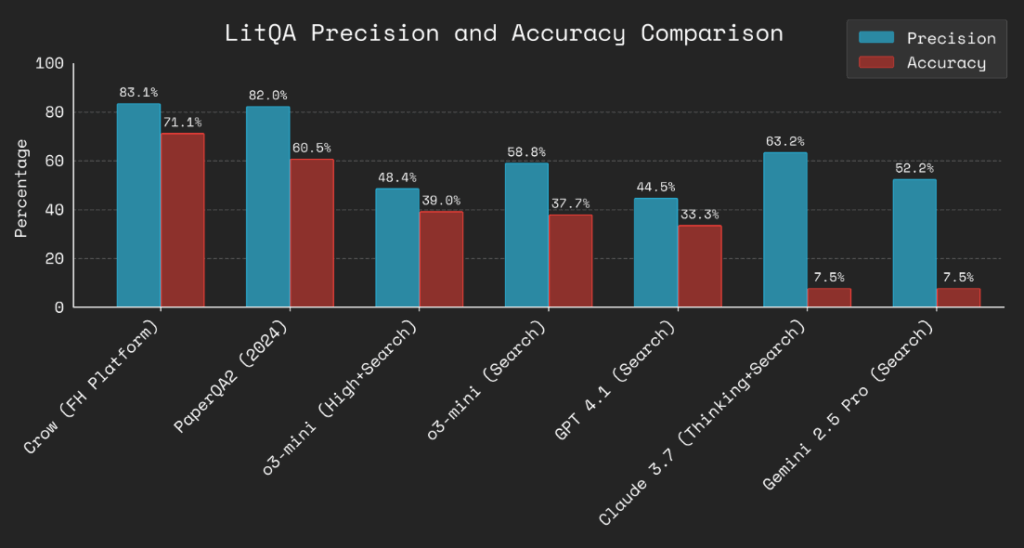Artificial intelligence (AI) is steadily entering crucial industries where human involvement remains essential. One of these is scientific research. New technologies and advanced algorithms are beginning to challenge human potential, and a prominent example of this is FutureHouse’s work. So, what opportunities does AI have here?
FutureHouse Initiative
FutureHouse is a non-profit initiative for automating scientific research that aims to automate the research process and deliver an AI scientist or a complete system to the market.
On May 1st, the organization made a major leap forward by launching a platform – superintelligent AI agents for scientific discovery. Scientists around the world can try out these first-of-their-kind tools for free via a web interface and API (available for testing here).
AI Agents Created by FutureHouse
The platform provides users access to four different AI agents, each focused on a specific aspect:
- Crow – Concise Search. A general-purpose agent that navigates scientific literature and provides answers to scientific questions. It operates through an API.
- Falcon – Deep Search. A tool designed for in-depth literature reviews. It searches and synthesizes large volumes of scientific literature and can access specialized databases like OpenTargets.
- Owl – Precedent Search. This model’s main function is to answer whether someone has already done a particular piece of work.
- Phoenix – Molecular Synthesis. An experimental tool focused on planning chemistry experiments.
All models have been built from scratch and tested through benchmark research. Based on these tests, FutureHouse claims that their AI agents outperform all major cross-domain search models in terms of accuracy.

Comparison of AI agents and frontier models. Image credit: FutureHouse
Advantages of these AI agents:
- Access to numerous high-quality open-access articles and other specialized scientific tools. These solutions allow researchers to automate workflows and help assess source quality.
- Transparent reasoning process. AI agents use a multi-step system that enables them to examine each source in detail, with the researcher seeing the agent’s reasoning.
- API access. This makes researchers’ work easier through a more user-friendly interface.
AI’s Rise in the Academic Environment
AI giants and startups are increasingly developing tools targeted at researchers and their scientific work.
AI tools, much like in other sectors, could significantly contribute to scientific discoveries — especially in the medical field. However, due to issues such as unreliable information, AI hallucinations, limited access to sources, and more, AI is still met with some scepticism. This creates a need for high-quality tools.
Although FutureHouse has yet to achieve a scientific breakthrough using AI, it is moving forward by improving research capabilities for scientists. It is believed that such agents will eventually resolve the nonlinear nature of scientific research — where researchers don’t follow a straight path toward results, but instead continuously refine and revisit their approaches. This is necessary due to the constant emergence of new data and the sheer volume of information, but such technologies are capable of handling this automatically and efficiently.
This is explained by the organization’s engineering enthusiast Michael Skarlinski:
“A lot of problems in science, especially around using literature or using a lot of data sources, are nonlinear. You need to think of some subhypothesis in order to answer a question, look at the quality of that information, and then evaluate it and maybe do a different search after. This process is fundamentally agentic. You can’t do it with a linear workflow.”
Speed means that researchers can complete their work significantly faster. The transparency problem is solved by the agents presenting their logical sequence, allowing for verification.
Final Thoughts
The case of FutureHouse shows that AI is gradually being specialized and integrated into scientific workflows to enhance researchers’ productivity. While there is still much to be done, it is becoming clear that once current challenges are overcome, researchers may be left to focus solely on creative tasks — formulating hypotheses and seeking discoveries.
If you are interested in this topic, we suggest you check our articles:
- Mendeley and the Role of AI in Research Management
- Advancements in AI-Powered Research Tools
- AI for Document Analysis: Transforming Data Extraction and Processing
Sources: Anthropic, FutureHouse, TechCrunch
